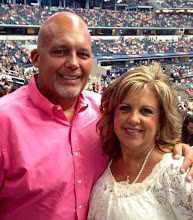All of us who take on the role of leadership are susceptible to derailment. So, I think its important to share some important preventive measures. To do this I am going to build on an acrostic I learned at the Fellowship of Christian Athletes camp in Estes Park Colorado in August of 1974.
(When Laura reads this she will say: "How is it you can remember something from August 1974, but you can't remember what I said 10 minutes ago?" So let me go ahead and make a preemptive plea: Guilty as charged.)
I don't remember who was speaking that August night, but he shared an important principle used by people in recovery groups: The H-A-L-T principle. Never get too hungry, too angry, too lonely, or too tired. When we are in any of those conditions, we are particularly vulnerable.
I want to expand the acrostic as a derailment preventative for leaders:
H-A-L-T-E-R.
H: Never get too hungry. Don't let your physical hungers get out of hand. We understand that. Satisfied needs are not motivators, and unsatisfied needs are powerful motivators. But beyond physical hungers, don't let your hunger for positions get out of hand. And don't let your hunger for possessions lead you to be too greedy. Hungry leaders are vulnerable to temptations.
A: Never get too angry. The Apostle Paul offers great advice on this in Ephesians 4:26-27: “Be angry, and yet do not sin; do not let the sun go down on your anger, and do not give the devil an opportunity.” Keep short accounts, resolve conflict constructively, and if its not a federal case, don't make a federal case out of it.
L: Never get too lonely. As leaders, we must not allow the stress of the job and the pace of our schedules prevent us from nurturing our most significant personal relationships with our spouse and our family.
T: Never get too tired. The race we are called to as leaders is a marathon, not a sprint. We must pace ourselves so that we can stay in and finish the race we have been called to. We must learn to allow ourselves the discomfort of taking time off. The organization will not go broke and no one will die if we commit to taking a date night once a week, a weekend get away once a quarter, and a full - technology free - vacation once a year. When we are depleted, our fuses are short and our decision making suffers.
E: Never get too entitled. Success brings it own downside for many leaders. After working hard to attain positions and build organizations, many leaders often feel they deserve extra benefits and compensation. Often, they begin feeling entitled to extra perks that often are in violation of accepted standards or prudent stewardship of the organization's resources.
R: Never get to remote. Leaders who lose touch with those they lead are setting themselves up to falter. I have challenged city managers and university presidents on this issue. Too often as leaders move up in their organizations they forget where they came from and lose touch with the people in the trenches. This isolation isn't healthy relationally and it also cuts off an important flow of information. Remote and isolated leaders are out of touch with the pulse - the heartbeat - of the organization. This becomes even more acute in organizations that consciously filter the information flowing to the top. The "palace guard" keeps the leader from knowing what's really going on.
Do you have a derailment halter?


No comments:
Post a Comment